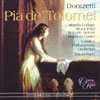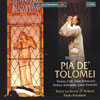Donizetti Pia de' Tolomei
A double dose of forgotten Donizetti and the final choice is finely poised
View record and artist detailsRecord and Artist Details
Composer or Director: Gaetano Donizetti
Genre:
Opera
Label: Opera Rara
Magazine Review Date: 12/2005
Media Format: CD or Download
Media Runtime: 207
Mastering:
Stereo
DDD
Catalogue Number: ORC30

Tracks:
| Composition | Artist Credit |
|---|---|
| Pia de' Tolomei |
Gaetano Donizetti, Composer
Bruce Ford, Ghino, Tenor David Parry, Conductor Gaetano Donizetti, Composer Geoffrey Mitchell Choir London Philharmonic Orchestra Majella Cullagh, Pia, Soprano Patrizia Biccire, Bice, Soprano Roberto Servile, Nello, Baritone |
Composer or Director: Gaetano Donizetti
Genre:
Opera
Label: Dynamic
Magazine Review Date: 12/2005
Media Format: CD or Download
Media Runtime: 128
Mastering:
Stereo
DDD
Catalogue Number: CDS488/1

Tracks:
| Composition | Artist Credit |
|---|---|
| Pia de' Tolomei |
Gaetano Donizetti, Composer
Andrew Schroeder, Nello Clara Polito, Bice, Soprano Dario Schmunck, Ghino Gaetano Donizetti, Composer Paolo Arrivabeni, Conductor Patrizia Ciofi, Pia, Soprano Teatro La Fenice Chorus Teatro La Fenice Orchestra |
Author: John Steane
This tale is elaborated upon by the librettist and his sources, the jealous husband being provoked by a rejected suitor who in revenge denounces Pia for having a secret lover, a mysterious visitor who turns out to be her brother. Four leading roles, then, with the brother, Rodrigo, a trousers part for the mezzo. The heavy husband is naturally the baritone, leaving the tenor in the unsympathetic role of Ghino, the rejected lover and informer. This, however, is the most interesting of the four principals, as his music predisposes us to like him, and he later undergoes a change of heart, taking part in a duet with Pia which is probably the most moving number.
Written in 1837, it is a work of Donizetti’s maturity; nevertheless, it disappeared from view in 1862 and had to wait more than 100 years (1967) for a revival. The most recent revival brought it back to the place of its intended premiere, La Fenice, which was burnt down as Donizetti was on his way there: this is the 2005 production recorded on Dynamic with Patrizia Ciofi in the title-role. Opera Rara put on a concert performance at the Royal Festival Hall the previous year and its recording is based (with certain changes) on that.
As always with Opera Rara productions, the booklet is a work of scholarship. Moreover, there is a third disc providing an invaluable bonus of alternative versions – Donizetti had endless trouble with the finale to Part 1 and revised several numbers (including the final scene to substitute the required happy ending) for Naples in 1838. The Venice recording is a perfectly good one but its particular strengths are not such as to outweigh the advantages that Opera Rara offers for most listeners.
But many must still be asking whether the opera is really any good. After all, it is one of the last of Donizetti’s forgotten operas to come to our attention in a worthy recording. Donizetti specialists are divided and rarely has it been seen as a revelation-in-waiting. And I would say now that first acquaintance may suggest a verdict little more positive than that of one critic at the premiere – a succès d’estime.
It is very well made, musically and dramatically; the score is full of ideas and it rises to the demands of each moment. You don’t at first, perhaps, come away with much to remember, yet there is a special energy in that first finale. More tellingly, a special feeling emerges in the duet of Ghino’s conversion: this is near to Verdi in its development. And the later solos of Nello (‘Lei perduta’) and Pia strike a depth. This is an opera which grows rather than diminishes with a deepening acquaintance.
I find the Italian recording warmer in sound, and a little more vivid in that we are more aware of stage action. The orchestral standard is higher in London, with David Parry strong in energy where Paolo Arrivabeni makes much of the lyricism. The singing is fine, though in both one is conscious of an unattained ideal. Patrizia Ciofi’s lovely voice has loosened somewhat, and Majella Cullagh’s seems to have lost something of that gentle, rounder sheen it had a few years ago. In the travesti part of Rodrigo, Laura Polverelli is fluent and quite powerful, not ideally even, however; Manuela Custer fresh and affectionate, and generally preferable. As the ambivalent Ghino, Bruce Ford sings with intense feeling but Dario Schmunck, having been too unvaried at first, makes an increasingly favourable impression and he is one whose singing creates an appetite for more. Both baritones do well, though there seems always a point (reached fairly soon) beyond which Roberto Servile’s voice will not take him, while Andrew Schroeder’s has bloom and promise of more. As to the choice, if you want to learn about Pia de’ Tolomei while enjoying the sound, Opera Rara’s is the set to go for.
Discover the world's largest classical music catalogue with Presto Music.

Gramophone Digital Club
- Digital Edition
- Digital Archive
- Reviews Database
- Full website access
From £8.75 / month
Subscribe
Gramophone Full Club
- Print Edition
- Digital Edition
- Digital Archive
- Reviews Database
- Full website access
From £11.00 / month
Subscribe
If you are a library, university or other organisation that would be interested in an institutional subscription to Gramophone please click here for further information.




